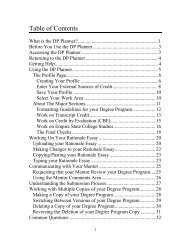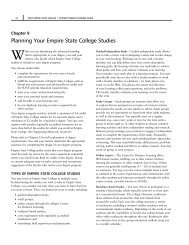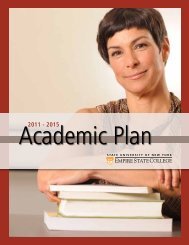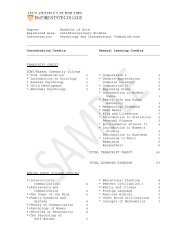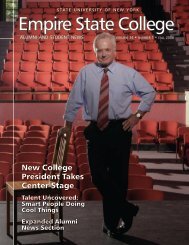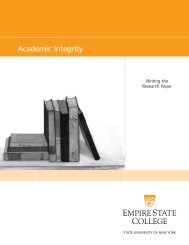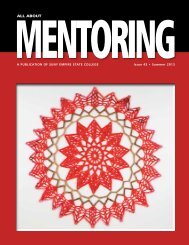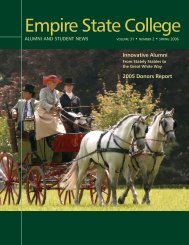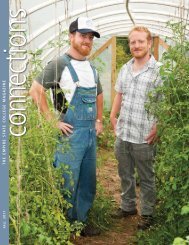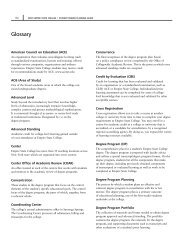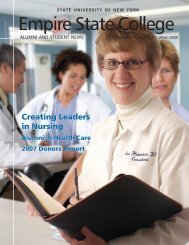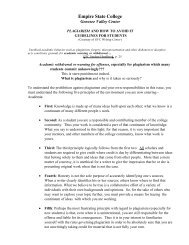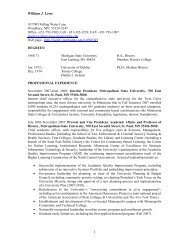All About Mentoring Spring 2011 - SUNY Empire State College
All About Mentoring Spring 2011 - SUNY Empire State College
All About Mentoring Spring 2011 - SUNY Empire State College
You also want an ePaper? Increase the reach of your titles
YUMPU automatically turns print PDFs into web optimized ePapers that Google loves.
22<br />
mother and wife. If women’s experiences<br />
are contradictory and fraught with sexual,<br />
physical and emotional abuse, their<br />
pathways may be littered with a series of<br />
bad choices that lead to imprisonment.<br />
Thus, female criminals have not become<br />
more dangerous; rather, the system has<br />
become more punitive in response to<br />
the crimes they have committed (Bloom,<br />
Chesney-Lind, and Owen, 1994).<br />
The theoretical base for my study was<br />
informed by two main ideas that are<br />
constructive-developmental in nature: that<br />
the meaning of the women’s lives during<br />
incarceration shape their futures following<br />
release; and, that how the women learn to<br />
participate in the process of knowing (i.e.,<br />
Women’s Ways of Knowing) influences<br />
their understanding of self and their ability<br />
to navigate in the larger world. The most<br />
prominent finding of my study was that<br />
while the skills and knowledge attained<br />
through higher education are critical for<br />
releasing women to become financially<br />
stable, the transformation they have made in<br />
their ways of knowing about self and others<br />
are the true guide to successful re-entry.<br />
Approach<br />
In Weis and Fine’s (2000) discussion of a<br />
social researcher’s role in sustaining “safe<br />
spaces” in qualitative research, the authors<br />
posited:<br />
The spaces into which we have been<br />
invited provide recuperation, resistance,<br />
and the makings of ‘home’ … Not rigidly<br />
bound by walls or fences, the spaces often<br />
are corralled by a series of (imaginary)<br />
borders where community intrusion and<br />
state surveillance are not permitted. These<br />
are spaces where trite social stereotypes<br />
are fiercely contested. (p. 57)<br />
Thus, the success of this study was<br />
dependent upon my ability to tread carefully<br />
and respectfully into this innermost<br />
sanctuary, or space, and to seek the stories<br />
women have to tell about their journeys<br />
during and following their release from<br />
prison. To this end, my perspective and<br />
experience with imprisoned women was<br />
germane to my effectiveness in gaining<br />
access to, and most importantly, the trust<br />
of the participants. My genuine motivation<br />
and trail of my life’s work provided me<br />
admittance into those spaces that might<br />
otherwise be barred from access. Women<br />
who trusted me referred me to others, and<br />
my immersion into the process of in-depth<br />
interviews to seek understanding of the lifeviews<br />
of women began. The study focused<br />
on a single, overarching question: do college<br />
learning experiences in prison contribute<br />
to positive reintegration for women upon<br />
release; and if so, how do those experiences<br />
improve released women’s reintegration<br />
Schuante invited me to interview her at the<br />
tiny, one bedroom apartment she calls home.<br />
It was clean and neat, and illustrative of<br />
the pride she has in her life now. Her lived<br />
experience, as shared with me, was both<br />
tragic and inspiring as a story of life at its<br />
worst and its best.<br />
Early Memories of Learning<br />
To understand the stories of their lives<br />
prior to incarceration, I initiated the<br />
interviews with questions that would<br />
encourage the participants to reflect on<br />
their early memories of life and their first<br />
experiences with learning. Schuante talked<br />
about her family as a “middle-class family”<br />
and recalled that she “never wanted for<br />
anything.” She was brought up “with<br />
manners” and she “believed in God.” She<br />
shared her positive memories of her early<br />
school years and the teachers who told her<br />
that she had potential.<br />
Early in the interview, Schuante disclosed<br />
that as a young child she had been happy,<br />
had loved school, and was raised by a<br />
family who could take care of her needs<br />
and support her interest in gymnastics<br />
and extracurricular activities. The tragedy<br />
that occurred in her life at age 13 was the<br />
moment that, in her own words, “took me<br />
way off course.” As she shared her story<br />
with me, the emotion was still raw and the<br />
tears barely under control.<br />
I was young and I had a brother that was<br />
killed and he was shot outside at close<br />
range and for me to be a little girl, 13<br />
years old, and it was right around the<br />
corner from my house and it was at the<br />
beginning of the school year and I was<br />
happy about going back to school, then<br />
something like this happened. So I finally<br />
got up the courage to go around there<br />
to where my brother was at … from the<br />
way it sounded, it was really bad. So<br />
when I went around there and saw what<br />
I saw, my brother laying in the street …<br />
big hole in his stomach, bones sticking<br />
out … oh my God. … he didn’t make it<br />
… so I was just so crushed … . I didn’t<br />
understand … I gave up on everything,<br />
I had to go to school, I had to walk<br />
around the corner and see the stain from<br />
my brother’s blood … oh God. So then I<br />
started taking another route, which was a<br />
longer route because I didn’t want to walk<br />
by and see that. I started skipping school,<br />
I gave up on everything. … I come from<br />
a middle- class family, never had to want<br />
for nothing. I let it all go, next thing I was<br />
hanging with the wrong crowd, ditching<br />
school. I got on drugs, in and out of jail,<br />
prison …<br />
Seven of the interviewees in this study<br />
specifically referenced a loss of self-esteem<br />
as they grew older and experienced lifealtering<br />
events. Five of the women began<br />
with stories of positive recollections, while<br />
six of them began with memories of difficult<br />
childhoods. However, all of the participants<br />
expressed some level of discord in their lives<br />
early in the interview. To their self-portraits,<br />
Schuante and three others added descriptors<br />
such as “lost,” “hopeless” and “depressed.”<br />
While the type of trauma endured by<br />
each woman may have differed widely in<br />
seriousness or intensity from an outsider’s<br />
point of view, each woman revealed a<br />
profound sense of sadness as she shared her<br />
story of the beginning of what eventually led<br />
to a downward spiral in her life. For some,<br />
it was a tragic event; for others, it was a<br />
defining moment of marginalization in their<br />
lives – a specifically, bounded time when<br />
in retrospect, they began to see themselves<br />
falling into a void of unhappiness and selfloathing.<br />
Transitioning to Learning in Prison<br />
Each of the participants shared her<br />
beginning moments of attempting to deal<br />
with the crises in her life by taking charge –<br />
or empowering herself – to change direction.<br />
In their own words and way, they were<br />
sharing their memories of trying to gain<br />
their voices (Belenky, Clinchy, Goldberger &<br />
Tarule, 1997/1986). <strong>All</strong> of the participants<br />
expressed their desire to enroll in college<br />
classes, but with some trepidation and an<br />
suny empire state college • all about mentoring • issue 39 • spring <strong>2011</strong>



